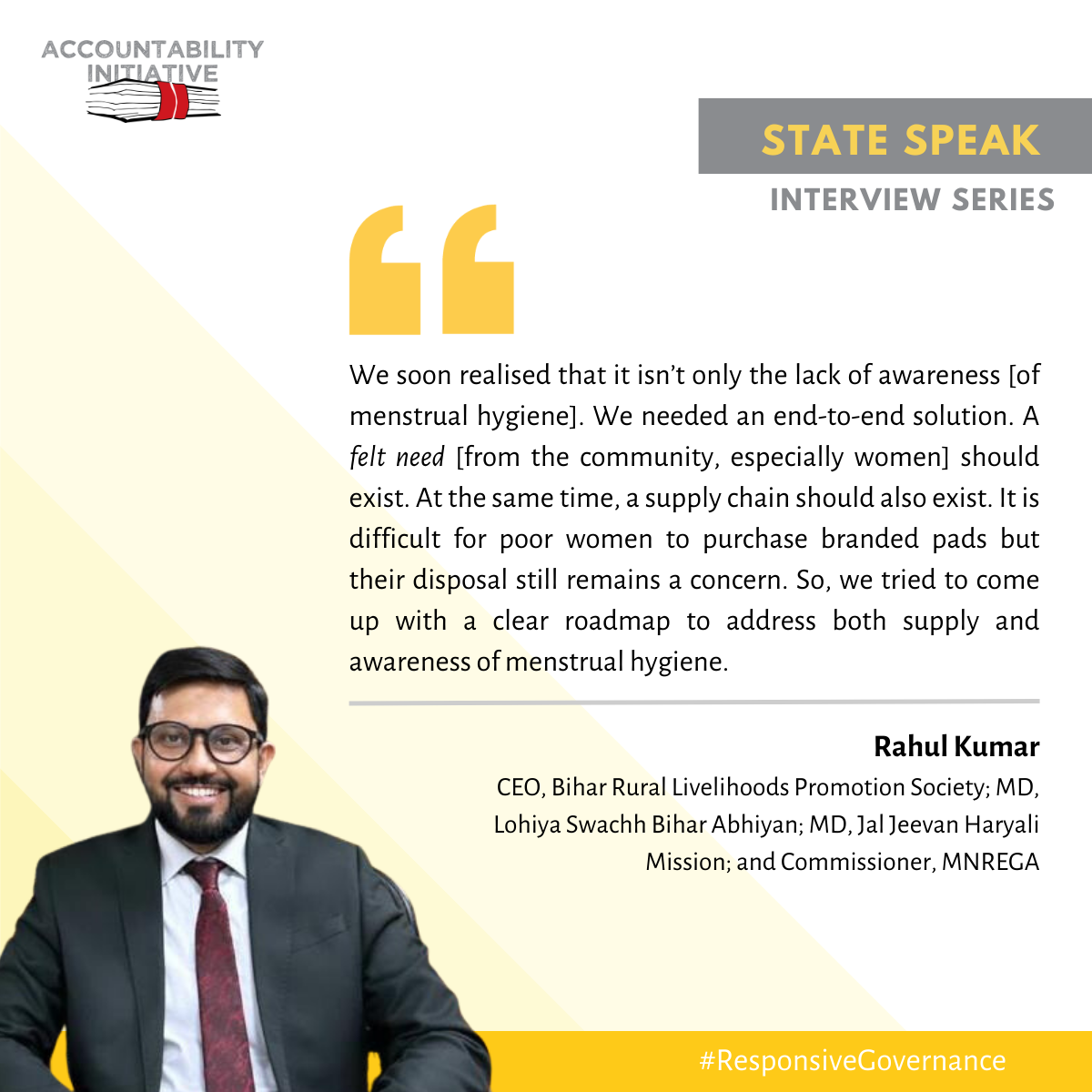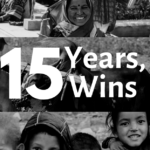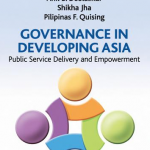
We tried to come up with a clear roadmap to address both supply and awareness of menstrual hygiene: Interview with IAS Rahul Kumar
2 August 2023
The bureaucracy is considered to be the steel framework that makes the country’s development aspirations a reality, but little is understood in the public about the people behind the scenes. State Speak is an exclusive interview series by the Accountability Initiative featuring insights from IAS officers posted in India’s districts and other public officials who have a vantage point on how the country is being governed, related challenges, and best practices.
In this interview, we spoke to Rahul Kumar, who is an IAS based in Bihar. He is currently posted as CEO, Bihar Rural Livelihoods Promotion Society; MD, Lohiya Swachh Bihar Abhiyan; MD, Jal Jeevan Haryali Mission; and Commissioner, MNREGA.
Q. We recently spoke to some front-line health workers about the status of menstrual health services in Bihar. We found that no state scheme is currently operational in the state. You have recently launched an action plan for Menstrual Hygiene Management (MHM) in Purnea, the first of its kind initiative in Bihar. What were some of the reasons for coming up with an initiative like this?
Rahul Kumar: During a sanitation drive, while assessing toilet access to families, I noticed that women called toilets “izzat ghar”. I got to know that if a family doesn’t have toilets, it affects both females and males but more so females. One of the difficulties, which was unique, was that during menstruation, women had to go out of the house and dispose of the menstrual cloth or pad. So, it became clear to me that toilets are not just a basic amenity but it is also about dignity.
We soon also realised that it isn’t only the lack of awareness. We needed an end-to-end solution. A felt need [from the community, especially women] should exist. At the same time, a supply chain should also exist. It is difficult for poor women, for instance, to purchase branded pads but their disposal still remains a concern. So, we tried to come up with a clear roadmap to address both supply and awareness of menstrual hygiene.
Q. Can you tell us more about how you went about planning for this and some of the proposed activities?
Rahul Kumar: As a first step, we identified thought leaders, which included front-line health workers (Anganwadi Workers (AWWs) and Accredited Social Health Activists (ASHAs)), Jeevika (Self Help Group (SHG)) members, people from the education department, and Panchayati Raj Institution (PRI) members, and also some NGOs, which were working with UNICEF. We called a meeting, which also included many female officers. We asked them to speak freely about their difficulties with respect to menstruation. But, they were hesitant to speak up. Despite being female officers, they were hesitant to use the word “menstruation” and instead used abstract words to describe it. So, if we only find it [a] taboo, it is the first bottleneck to address. This led to drafting a training program. We wanted to train a [task] force which would then go on spreading awareness in the communities to prepare them for this felt need, which I also mentioned before.
As a part of this lead force, we got on board 50 master trainers. At this same time, the state government issued a notice to open schools in every panchayat. This was to address the high girl dropouts after class 8, as it was found that it was hard for them to travel long distances. So, in 2020-21, in my district, which has 246 panchayats, we constructed these classrooms. I also proposed to construct MHM friendly toilets in every school, so that girls don’t continue to drop out. So, I sent a proposal to NITI Aayog and after a few deliberations, it got approved. Purnea is the only district to have these toilets.
We wanted to tap Jeevika’s community presence in Bihar. They continue to play a pivotal role as they are present in all villages of the state. SHGs hold regular meetings, and apart from their own financial inclusion agenda, we encouraged them to also start talking about menstruation – where to get sanitary pads and how to dispose of it. As a next step, we also included the education department, and the response here was also positive. Many male teachers also volunteered to participate as master trainers. Their involvement is important as this issue requires community participation.
Q. What are Bihar’s challenges in implementing Union or state level schemes that deal with menstrual health and hygiene?
Rahul Kumar: These schemes are present in Bihar but, as I told you, the gap between demand and supply [for menstrual hygiene] is huge in Bihar. The level of awareness and literacy is minimal in rural pockets. In 2014-15, when Open Defecation Free (ODF) Phase 1 began, according to the baseline study, only 20 per cent households had toilets. Communities are also dependent on local solutions, so we decided to focus on the health and hygiene part. We kept in mind that when master trainers spoke to the community, they also spoke about diseases and sometimes even deaths due to contaminated cloth.
In Bihar, the education department also transfers ₹300 annually to households for buying sanitary pads. But, we don’t have data on how many girls actually purchase pads using this money. This is also true with other Direct Benefit Transfer (DBT) schemes like uniforms and books, as there is no control over how purchases are made.
So, with the help of Jeevika and under SBM, we started a biodegradable sanitary napkin unit in Buxar. Phase 2 of ODF, which includes Solid Waste Management (SWM), lays importance on MHM and menstrual waste disposal. In this phase, we have also been giving two dustbins to each household for solid and liquid waste, and a small bin for sanitary napkins. We are also planning to build incinerators for proper disposal, so that waste processing happens at the panchayat level.
Q. Do you think that the existing cadre of front-line health workers are equipped with the capacity to drive menstrual health in the state? How is the Jeevika task force bridging this gap?
Rahul Kumar: I will not say that they are equipped well on the ambit of menstrual health. But, we have started doing things, especially with Jeevika. We introduced a health nutrition and sanitation theme, and drafted many modules based on them because this addresses poverty alleviation as well. Health and nutrition is directly linked to poverty alleviation efforts. Out of Pocket Expenditure (OOPE) on health for poor households is very high. All our efforts are undone because of health hazards. So, while we promoted nutri gardens, dietary diversity (0-2 year age group), etc., we have also included an MHM module under it. If a module is drafted well with development partners, it can work.
We are doing these with Jeevika. In Purnea’s roadmap, it was a well drafted document and we had certain short-term goals. Time-based targets were in the roadmap. We started certain things but then I got transferred.
In Jeevika, we have a dedicated cadre of the Community Nutrition Resource Persons (CNRPs). These are SHG women but are trained to work as resource persons under the MHM action plan too.
There is another state level task force, headed by the Development Commissioner and stationed at the Women and Child Development Corporation (WCDC). I am also its member and have attended a few of these meetings. Here too Jeevika has a role to create awareness. Bihar has more than 6 lakh Jeevika microenterprises. Because having dedicated medical shops for this is difficult, we are also placing posters in villages. In fact, the biodegradable manufacturing unit for sanitary napkins in Buxar is also run by women.
Our product is a little costlier because it is biodegradable. We are trying to advocate with institutional buyers like the police and education departments, so that they can purchase our pads.
Q. Women and adolescent girls are hesitant to discuss this topic. How do you think your initiative can navigate this?
Rahul Kumar: So, when we were launching this roadmap on Women’s Day 2022, in the meeting hall we had SHG members and women officers. One 16 year old girl, who was the daughter of an SHG member, spoke about her experience. For an adolescent girl, it was a double jeopardy: On one hand, she was suffering from physical discomfort and, on the other hand, there had been no solution at the resource or consultation level, and sometimes there was even misguidance. Once she came to know about MHM resource persons through her mother, she has not only learnt about hygienic menstrual health practices but has also communicated this with her classmates.
Q. How do you imagine community-wide participation for this initiative?
Rahul Kumar: We have included PRI, ward members, and the mukhiya in these conversations too. I will not say that the objective has been met but we have taken the first step. SWM is being talked about everywhere in Bihar. As part of our next step, we should include menstrual health and waste disposal in MHM planning, as it will open areas which are generally considered taboo. Our community cadre of Jeevika – with a reach of 1.3 crore households – and PRI members will play a very important role in bringing the community together.
Q. Will the initiative also make efforts to include front-line workers in planning for menstrual health?
Rahul Kumar: The task force at the state level is under WCDC. PRI, health, and social welfare is also a part of this state level task force. The primary duty of the health department is to train front-line workers. Health department also has a role to play during the Village Health Sanitation and Nutrition Committee (VHSNC) meetings and at Primary Health Centres (PHCs). For instance, in a PHC, when a woman comes for Ante Natal Care (ANC) checkup or other treatment, health workers have to talk about the Rashtriya Kishor Swasthya Karyakaram (RKSK) program.
Through this MHM plan, we are spreading awareness in the community, and even include old age women and adolescents. But, health workers have to reach a target group. For instance, ASHA workers mostly engage with target groups who go to hospitals.
The idea is to reach as many people as possible. Even with AWWs, when they distribute Take Home Ration (THR), menstrual hygiene related discussion should take place. There is a new practice in Bihar: During the Ann Prashan Diwas, a pregnant lady is counselled on nutrition, there, as well, the state level task force has tried to include conversations around menstrual health.
Q. In the COVID-19 pandemic, households did not prioritise the purchase of period products. This was particularly the case for rural households. At the same time, according to NFHS-5, around 67.5 per cent of women are still using cloth during menstruation in Bihar. What kind of challenges do you foresee in the uptake of your MHM plan?
Rahul Kumar: We need to see this problem in two parts: First is reaching the poorest of the poor, those who don’t have sufficient money to buy basic goods. These people cannot afford buying sanitary napkins. The second is about creating a prioritisation for menstrual health and hygiene in households. We saw that during the ODF and toilet construction drives, many households with tractors, smartphones, and mobile phones did not have toilets. The traditional thinking in these households is to not prioritise toilets. The thinking that a toilet cannot co-exist with a kitchen in the house. So, both prioritisation for this and tackling conservative thinking need to go hand in hand.
Q. How can sustainability in using hygienic menstrual methods be ensured?
Rahul Kumar: In our roadmap, since we were just starting out, there was no precedence. We didn’t get to cover everything under the ambit of hygienic menstrual practices. But I am sure that there are sustainable usage and disposable practices across the globe. But, as of now, I can’t comment much on it.
Q. How do you imagine other districts in Bihar, and even states across India, co-opting this model?
Rahul Kumar: I think Sitamarhi also made its MHM plan after Purnea. The state task force, as I mentioned, is already doing this at that level. So, soon, this should happen in all districts.
Q. Lastly, what is the administrator’s (IAS officer in-charge) role to drive something like this?
Rahul Kumar: As administrators, we come to know about many challenges that people face as we travel a lot and meet different stakeholders of society. As DM, we should play that interdepartmental coordination role. We should try to ensure that departments do not work in silos. Jeevika and the health department, for instance, should not work in silos but together and at the same time ensure that there is no duplicacy of tasks.
This interview has been edited for length and clarity.
The opinions expressed are personal and do not represent an institutional stand.
Read more State Speak interviews here.





